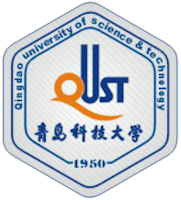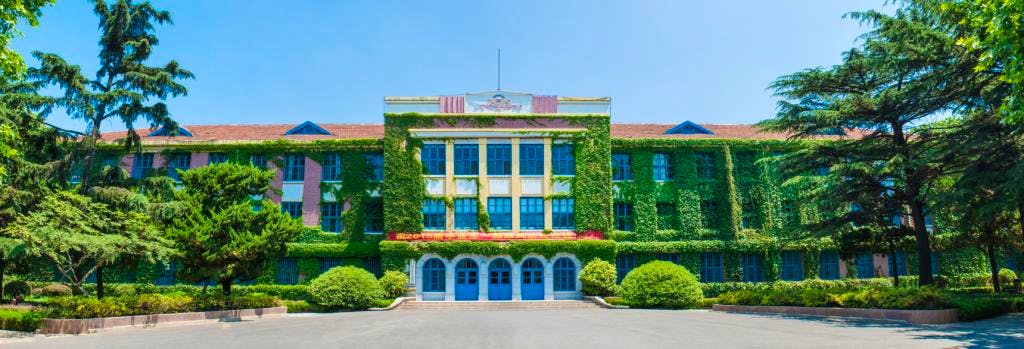Introduction
Qingdao University of Science and Technology (QUST) is a multidisciplinary university with a particular focus on engineering, which coordinately develops with science, engineering, literature, economics, management, medicine, law, art, and education. It is a key university directly affiliated to Shandong Province and a preeminent featured university for the cultivation of fundamental and professional talents approved by the Shandong provincial government. Furthermore, it is evaluated as an “outstanding university for its undergraduate education” and a “national top university in its practice of the employment of graduates” by the Ministry of Education (MOE), and praised as “Huangpu Military Academy of China Rubber Industry” by the society.
Shenyang Advanced Vocational School, the predecessor of QUST, was founded in 1950 and moved to Qingdao in 1956. In 1958, the school was upgraded into the Shandong Institute of Chemical Engineering under the approval of the People’s Government of Shandong Province and began to conduct higher education formally. It was renamed the Qingdao Institute of Chemical Technology under the approval of the MOE in 1984. In 1998, it was handed over to Shandong Province from the Ministry of Chemistry (MCI). In 2002, approved by MOE, the school was renamed Qingdao University of Science and Technology after merging Qingdao Arts and Crafts School in 2001. In 2009, Gaomi Campus was put into use. In 2016, QUST merged the Chemical Technology Academy of Shandong Province, composing a new chapter of its development.
QUST now has four campuses located respectively in Laoshan, Sifang, Gaomi, and Jinan, with a total floor area of 920,000㎡of its school buildings and the fixed assets of 2.8 billion yuan. Its library has a collection of over 3 million books and magazines. QUST has a professional staff of over 2100, among which there are 2 academicians, 8 double-hired academicians, 1 foreign expert of the Thousand Talents Plan, 1 youth expert of the Thousand Talents Plan, 1 leading personnel of the Ten-Thousand Talents Plan, 2 winners of the National Science Fund for Distinguished Young Scholars, 1 National Distinguished Model Teacher, 3 candidates of the “National Key Talent Project”, 4 National Young and Middle-aged Experts with Outstanding Contributions, 10 National Outstanding Teachers, 51 teachers enjoying the State Council Special Allowance, 2 leading talents of the characteristic & preponderant discipline of Taishan Scholars, 23 “Taishan Scholars” (specially-invited professors, specially-invited foreign experts and young experts) , 12 Provincial Distinguished Model Teachers, 5 academic pacesetters of Shandong Province, 4 leading experts of key disciplines of Shandong Province, 4 Top Ten Outstanding Teachers of Shandong High Education Institutions and 34 Young and Middle-aged Experts with Outstanding Contributions in Shandong Province.
Focusing on talent cultivation, QUST has made great achievements in teaching and teaching research, which include 2 State-level Teaching Awards, 1 National Innovative Experimental Zone for Talents Cultivation, 5 State-level Distinctive Specialties, 1 State-level Pilot Project of Comprehensive Specialty Reform, 3 majors accredited by Engineering Education Accreditation of MOE, 4 Experimental Programs of the National Outstanding Engineers Training Plan, 2 National Experimental Teaching Demonstration Centers, 1 National Teaching Center for Virtual Simulation Experiments, 2 National-level Teaching Teams, 2 National-level High Quality Sharing Courses, 1 National-level High Quality Public Audio and Video Course, 2 National-level High Quality Online Open Courses, 1 National-level Exemplary Bilingual Course, 1 National Engineering Practice Education Center, 1 Construction Project of Off-Campus Practice Base of MOE, 1 National Renowned Teacher, 191 projects of College Students’ Innovative and Entrepreneurial Training Plan, 26 Provincial Teaching Achievement Prizes, 1 Provincial Experimental Area of Personnel Training Mode, 5 Provincial High-level Applied Disciplines, 16 Provincial Brand Specialties and Featured Specialties, 3 Provincial Experimental Teaching Demonstration Centers, 7 Provincial Teaching Teams, 43 Provincial High-quality Courses, 12 Provincial Renowned Teachers. QUST has successfully passed the quality assessment of undergraduate teaching by the Ministry of Education.
Following the principle of developing the school through scientific researches, QUST has been promoting its scientific and technological innovation. To date, it has won 15 National Technological Invention Prizes, National Scientific and Technological Progress Prizes, and Dupont Technology Innovation Prize. Since 2011, the annual scientific research funds of QUST has reached over 100 million yuan for six years in a row, with a total of 1 billion yuan. QUST has made great achievements in the platform construction of scientific and technological innovation, and now it has 1 National Engineering Laboratory, 1 National Engineering Research Center, 1 State Key Laboratory Breeding Base, 3 Key Laboratories and Engineering Research Centers of MOE, 1 International Cooperation Base of the Ministry of Science and Technology, 1 National University Science Park. The above 8 national innovation platforms make QUST top the provincial universities in Shandong Province. Besides, it has 1 Provincial Collaborative Innovation Center, 35 Provincial Major Disciplines, Key Laboratories, and Engineering Technical Research Centers.
QUST has adhered to taking the path of government-industry-university-research cooperation and has yielded great economic benefits by applying scientific research achievements to actual production. Seven listed companies have been founded as the result of the transformation of scientific research achievements or offering core technology, namely MESNAC, Yantai Wanhua Group, Sailun Co. Ltd, Qingdao Kingking Group, Qingdao HILYWILL Advanced Materials Technology Co. Ltd, BOSTD Geosynthetics Qingdao Ltd, and Qingdao Gaoxin Co. Ltd. QUST has been twice awarded the title of “Outstanding University of Industry-University-Research Cooperation in Shandong Province” and was acclaimed as QUST Mode that was reported in depth byDecision-making Referencesof State Council Research Office, CCTV News and Focus Interview of CCTV.
QUST has insisted on the open strategy and constantly improved its international exchange and cooperation mechanism. At present, it has signed the friendly cooperation agreements with 106 foreign universities of 20 countries or regions. In addition, it has 1 Sino-foreign cooperative educational institution approved by MOE, 1 overseas educational institution and 6 Sino-foreign educational cooperation programs, forming a multilevel pattern of Sino-foreign educational cooperation, covering science, engineering, and art. Sino-German Technical College (CDTF in German) founded by QUST and the University of Paderborn of Germany has been raised up to the cooperation between the governments of Germany and China, and is honored as the model of joint-education cooperation. Through the introduction of German Dual Talent Training Model, QUST has fully launched the construction of the Sino-German Dual System Engineering College. Besides, QUST takes the lead to co-organize Sino-Thai International Rubber College, the first overseas educational institution of Shandong Province, which marks its first step of running the college in a foreign country.
At its 10thParty Congress, QUST drew a grand blueprint of “Three Steps”, set up its goal of building QUST into a high-level university with “Spirit, Culture, Responsibility, Vitality and Characteristic” (SCRVC) and clearly chose its strategies of “Innovative development, Coordinated development, Characteristic development, Open development and Shareable development”. At present, closely docking the requirements of the national objective of “First-class University, First-class Subject”, QUST is making great efforts to gather its strength, deepen the reform, and accelerate development to move towards the goal of a “Double First-rate” and high-level university with SCRVC.
Show less










